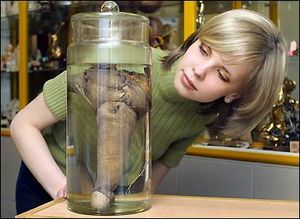Arts degree
An arts degree is a job requirement for French bus drivers and a useless piece of paper in much of the rest of the world. A typical arts degree can be had in two to four years at a genius factory; some whack-jobs spend, like, 20 years getting the smarties arts degree (referred to by its near anagram "masters"). Alternatively, your arts degree can be on your doorstep in 3 to 5 business days by calling 1-800-MYFASTDEGREE; our trained arts degree providers will be happy to answer any of your questions.
Degree content[edit | edit source]
The first year of an arts degree is taken up with a series of talking points, discussed in small cube rooms somewhere downtown or, on Fridays, outside on the grass with cookies and kool-aid. These lectures are typically presided over by forty-something white women wearing ethnic clothes in a cloying attempt to appear at ease with multiculturalism even though it scares the shit out of them. The primary point of discussion in year one is: "How can I go tens of thousands in dollars in debt while acquiring absolutely no vocational skills?"
80% of arts degree-earners drop out answering this question, while the remaining 20% enter year two, where more substantial issues are addressed. These include:
- Bad things white people have done to brown people
- Bad things men have done to women
With these subjects mastered, arts degreeners enter year three where they are likely to encounter male teachers who have undergone the tenure ceremony—an ancient blood oath with the master dragon of the genius factory, which allows recipients to pretend that everything they say matters and that their screwing around has some sort of poetic meaning. The actual courses take a variety of titles in this year, but core subjects remain:
- Why science isn’t really that important (e.g., The Light Speed "Constant" and Heterosexual Lesbianism: the Hermetics of Patriarchy)
- Why the West hasn’t actually accomplished anything (e.g., Colonialism and the Disinheritment of the Sunflower: The Myth of Progress BUSTED!)
With this accomplished, the few arts degreeners remaining return to a more serious look at the issues that underpin the arts degree in year four:
- Apologetics
- Revisionism
- Self-loathing
After they complete this year, the acquirer of the arts degree can a) become a French bus driver, or b) join the other downwardly mobile doing telemarketing.
Criticism[edit | edit source]
A long-standing criticism of the arts degree is that the arts are perverted, but come on. It is also said how ever that the only difference between an arts degree and a pizza is that a pizza can actually feed a family of four.
A more serious criticism: the modern academy has been in a state of self-denial since the mid-1960s given its inability to reconcile the broad truth of enlightenment values with cultural relativism. However, this is a reactionary argument in disguise and I’m not going to rise to it. If enlightenment, values and cultural relativism don’t go together then neither do beans and fricking wieners and I find it perfectly harmless to feed those to my kids on Saturday afternoons. There’s nothing inconsistent about forgiving or ignoring the misogyny, nationalism, and religious fanaticism of the non-Westerner in the name of multiculturalism, and crucifying straight, white, western men in the name of the same.
Next you’ll tell me that westerns are only able to over-educate themselves because of the surplus productivity and capital we’ve created on the backs of hundreds of millions of dead non-westerners. Now, I have lots to say about how terrible all those deaths are, but if you think I’m going to admit that I have any privilege because it, I’ll throw a bunch of journal articles that as many as twelve people have read, straight in your face. You can start with Chair Legs and the Empire State Building: The Ubiquity of Phallic Tyranny. If this doesn’t make sense to you now, it will eventually - after you spend tens of thousands of dollars on an arts degree.

